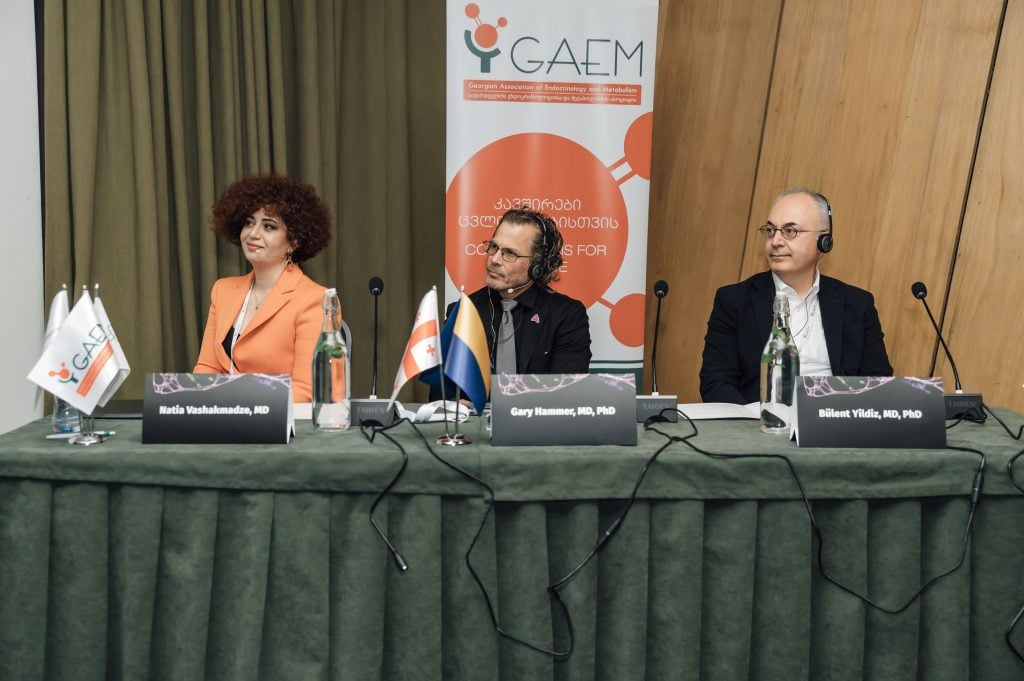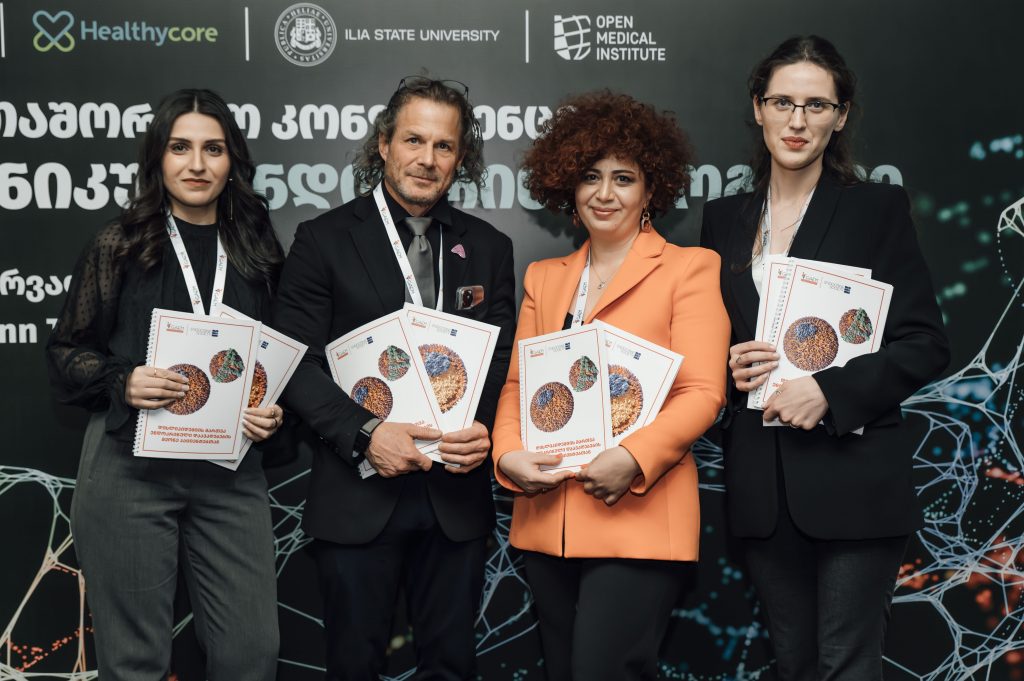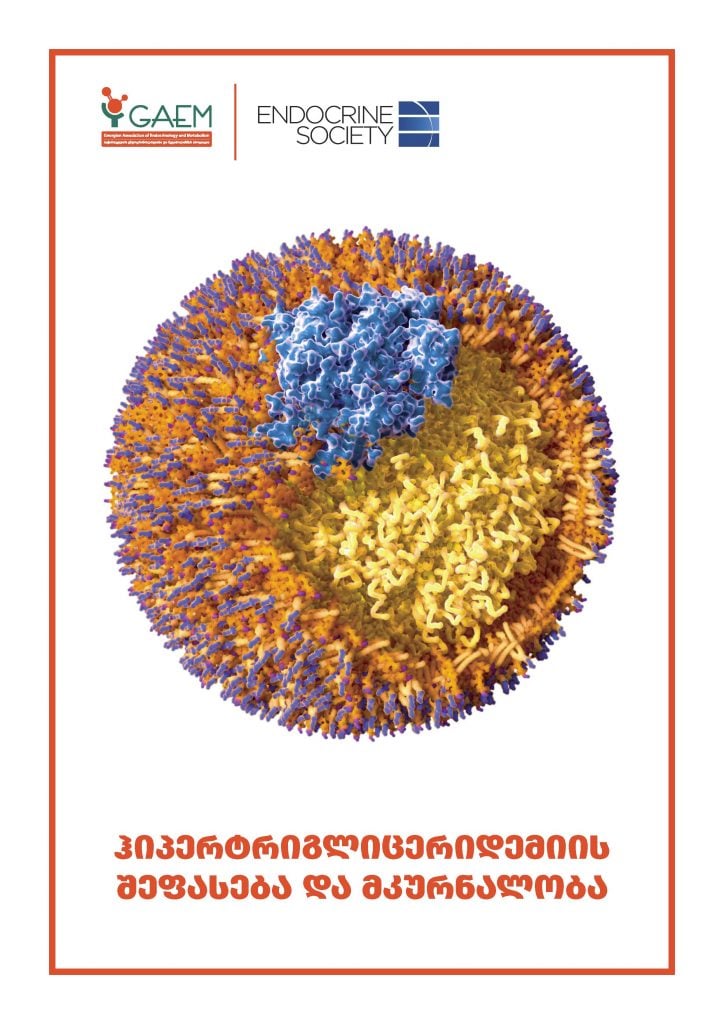When Georgian endocrinologist Natia Vashakmadze, MD, saw the need for an endocrine organization in her home country, she created one. In an exclusive for Endocrine News, she details the history of the Georgian Association of Endocrinology and Metabolism (GAEM), the importance of partnering with the Endocrine Society to share its Clinical Practice Guidelines, and GAEM’s future goals.
When the Soviet Union eventually crumbled on the day after Christmas in 1991, one unexpected present was that the country Georgia finally gained its independence. However, many aspects of life in these post-Soviet countries took time to change and evolve, and chief among them was the field of medicine. Thankfully, slowly but surely, Soviet influences have been fading into history while much of Georgia has been embracing the advances heralded by the West, especially medicine and science.
When I started my medical career, I discovered that scientific activity, meetings of doctors, and the exchange of modern information were not at the level and quality that I saw in the West. Of course, there were meetings and discussions, but they were usually less academic and often influenced by the pharmaceutical industry. I saw old rules and old traditions dictating how medicine should be practiced rather than adhering to contemporary international guidelines and the latest data. Medicine is a constantly changing field, and if one doesn’t update and move forward, it automatically means moving backwards.

Another complication to modernization is that many Georgian endocrinologists did not speak English well enough to read the medical literature, most of which is published in English. Therefore, the approaches to treating endocrine diseases were not as advanced here as they were in other countries. I wanted to bring modern, new, and evidence-based medicine to endocrinology in Georgia and share it with my colleagues who were yearning to learn.
When I first looked at what could be done realistically to develop the field of endocrinology in Georgia, I realized that any continuing medical education would need to be academic, unbiased, and, of course, of the highest quality.
Therefore, at just 30 years of age, I established the Georgian Association of Endocrinology and Metabolism (GAEM) in November 2018 with the aim of developing endocrinology and bringing it closer to Western standards.
Before and after the establishment of this organization, I was concerned about how the Georgian endocrinological community would receive my initiative. Specifically, whether such a big initiative by such a young doctor would be misunderstood and how much other doctors would sign on to my idea. It was not easy to leave my own comfort zone and embark on such a risky adventure. However, as soon as this idea occurred to me, it became clear that I could not rest until I did this. At first, of course, there were doubts, but soon the tireless work by me and my team paid off, and today the GAEM is trusted and has a great reputation, not just among Georgian doctors, but in the international arena as well.
Currently, the GAEM consists of a staff of seven (including myself), all enthusiastic and brimming with an endless number of ideas to not only improve GAEM as an organization, but to improve the practice of endocrinology throughout Georgia, and yes, around the world, much the same as the goals of the Endocrine Society.
Members of the GAEM team are: Nazi Tchelidze, Ketevan Dzagania, Nino Nadiradze, Tinatin Kutchukhidze, Nazibrola Chiradze, and Medea Tsereteli, all of whom are clinical endocrinologists, full of enthusiasm and we all love, enjoy, and take pride in what we do.
A Successful Debut
When I first looked at what could be done realistically to develop the field of endocrinology in Georgia, I realized that any continuing medical education would need to be academic, unbiased, and, of course, of the highest quality. So, to win the trust of colleagues, I decided to organize a large international meeting for the debut presentation of the organization, where colleagues would hear about the plans and vision of the GAEM as well as participate in our first event so they could experience firsthand what kind of activity our organization will offer them.

On the day of the presentation of the GAEM, together with my team, I translated and published the international guideline, which was distributed free of charge to the attending colleagues. I also invited an international expert who has great trust and reputation among Georgian doctors, along with local experts, who gave outstanding academic lectures.
I tried to create a very friendly and welcoming atmosphere for discussions and exchange of ideas, which led to a very positive response in the Georgian medical community. Despite the accolades and positive comments at the GAEM’s “unveiling,” there were also a few doubts and concerns that the association would not be able to maintain this high quality on a regular basis.
Connecting Via Conferences
Fortunately, since October 2018, we have held 10 international conferences with the participation of leading European and American doctors. For instance, in the fall of 2022, the GAEM organized and hosted the European Society of Endocrinology’s 30th postgraduate clinical course on endocrinology that was held for the first time in Georgia.
All the conferences organized by the GAEM are free from the influence of the pharmaceutical industry (which the attending doctors confirm in the feedback surveys) and is focused only on the dissemination of academic, up-to-date, unbiased medical information.
These meetings provide a platform for multidisciplinary meetings and discussion of patient cases, which is a unique way for Georgian doctors to gain and share knowledge and experience.

Most recently, the GAEM hosted the International Conference on Clinical Endocrinology on February 4 and 5, 2023. Internationally recognized faculty participated in the event including Endocrine Society past-president Gary Hammer, MD, PhD; the founder and president of the prestigious international conference EndoBridge, Bülent Yıldız, MD, PhD; expert thyroidologist Juan Carlos Galofré, MD; and expert lipidologist Peter Lansberg, MD, PhD.
The meeting was attended by 250 Georgian doctors, mostly endocrinologists, but also cardiologists, gynecologists, and internists, along with students and fellows who actively participated in the event. There was active engagement from the audience and discussion of rare and interesting clinical cases, which was very useful and practical for Georgian clinicians. This conference was held with the support and partnership of Ilia State University, the Israeli-Georgian Research Clinic Healthycore, and the Open Medical Institute (OMI).
Partnering for Publications
In addition, GAEM regularly translates and publishes high-quality, unbiased medical literature in Georgian. Unfortunately, there is an acute shortage of Georgian-language medical literature in Georgia. Since many Georgian doctors do not know English well enough to understand much of the medical literature, the association actively translates and provides medical literature in Georgian. For example, GAEM has translated and published guidelines and articles from internationally recognized organizations such as ETA (the European Thyroid Association), ATA (the American Thyroid Association), ADA (the American Diabetes Association) and, of course, the Endocrine Society.

GAEM, with the official permission of the Endocrine Society, translated and published two guidelines in Georgian: “The Assessment and Treatment of Hypertriglyceridemia” and “The Management of Dyslipidemia in Patients with Endocrine Diseases,” especially for the conference in February.

The Endocrine Society not only gave official permission for the translation and publication of those guidelines, but also sponsored the publication of the guidelines, and GAEM would like to thank the Endocrine Society for their help and support on behalf of all the members of the association. Since its foundation, the Georgian Association of Endocrinology and Metabolism has translated and published nine international guidelines, as well as more than 100 news articles in endocrinology, which are regularly published on the association’s website: www.gaem.ge. Moreover, GAEM has translated and is currently working on an edition of Elsevier’s book, Endocrinology of Aging: Clinical Aspects in Diagrams and Images, by Emiliano Corpas Cobisa.
Connecting for Change
Since GAEM’s founding, we became an affiliated member of the European Society of Endocrinology and the International Society of Endocrinology, translated and published 10 international guidelines, more than 100 articles and news in endocrinology in Georgian language and I think we have significantly developed the field of endocrinology and changed approaches to endocrine diseases, which directly translates into improved patient care and quality of life in Georgia. This is the biggest achievement and a source of pride for our team.
The slogan of the Georgian Association of Endocrinology and Metabolism is Connections for Change, the connections that the hormone makes with the receptor and the endocrine system makes in the body, creating life, movement, and change, as well as the connections that we people or even professional organizations make with each other to bring new positive changes around us and in our society.
The slogan of the Georgian Association of Endocrinology and Metabolism is Connections for Change, the connections that the hormone makes with the receptor and the endocrine system makes in the body, creating life, movement, and change, as well as the connections that we people or even professional organizations make with each other to bring new positive changes around us and in our society.
As the father of our Georgian nation and the source of my inspiration, Ilia Chavchavadze said, “Movement and only movement is the source of strength and life of the country.” For me, the beginning of this kind of movement and activity was a means of self-realization and self-motivation, which, I am very glad, turned out to be successful and now looks to the future with great ambitions and plans.
To that end, it is the goal of GAEM to keep moving forward and remain the positive change that it has become for the endocrine community in Georgia.
Vashakmadze is the founder and president of the Georgian Association of Endocrinology and Metabolism (GAEM).

